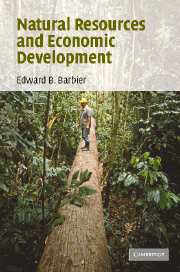Book contents
- Frontmatter
- Contents
- List of figures
- List of tables
- Acknowledgments
- Introduction
- 1 Natural resources and developing countries: an overview
- 2 Natural resource-based economic development in history
- 3 Does natural resource dependence hinder economic development?
- 4 Frontier expansion and economic development
- 5 Explaining land use change in developing countries
- 6 The economics of land conversion
- 7 Does water availability constrain economic development?
- 8 Rural poverty and resource degradation
- 9 Can frontier-based development be successful?
- 10 Policies for sustainable resource-based development in poor economies
- References
- Index
2 - Natural resource-based economic development in history
Published online by Cambridge University Press: 06 July 2010
- Frontmatter
- Contents
- List of figures
- List of tables
- Acknowledgments
- Introduction
- 1 Natural resources and developing countries: an overview
- 2 Natural resource-based economic development in history
- 3 Does natural resource dependence hinder economic development?
- 4 Frontier expansion and economic development
- 5 Explaining land use change in developing countries
- 6 The economics of land conversion
- 7 Does water availability constrain economic development?
- 8 Rural poverty and resource degradation
- 9 Can frontier-based development be successful?
- 10 Policies for sustainable resource-based development in poor economies
- References
- Index
Summary
The preceding chapter ended with posing a key paradox concerning the role of natural resources in economic development: why is it that, despite the importance of natural capital for sustainable economic development, increasing economic dependence on natural resource exploitation appears to be a hindrance to growth and development in the majority of low and middle-income economies of the world?
Of course it is important to examine this paradox in light of the use of natural resources by today's developing economies and how current economic theories represent this use. In fact, Chapters 3 and 4 will do precisely that.
The purpose of this chapter is to provide an insightful summary of the evolution of thinking on the contribution of natural resource exploitation to historical processes of economic development over key periods of time. The era of human history covered by this review is long; it ranges from 8,500 BC until the present day. In order to make sense of this long history, in terms of the role that natural resources play in shaping economic development, the chapter focuses on several key historical epochs or phases: the agricultural transition (8,500 BC to 1 AD), the era of Malthusian stagnation (1 AD to 1000), the emergence of the world economy (1000 to 1500), the Great Frontier and the rise of Western Europe (1500 to 1913), the Atlantic economic triangular trade (1500 to 1860), and the golden age of resource-based development (1870 to 1913).
- Type
- Chapter
- Information
- Natural Resources and Economic Development , pp. 51 - 107Publisher: Cambridge University PressPrint publication year: 2005



